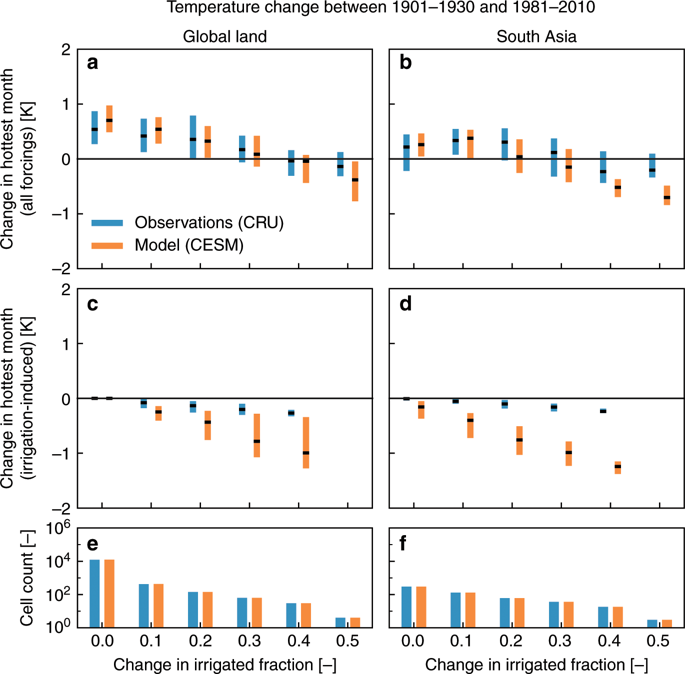当前位置:
X-MOL 学术
›
Nat. Commun.
›
论文详情
Our official English website, www.x-mol.net, welcomes your
feedback! (Note: you will need to create a separate account there.)
Warming of hot extremes alleviated by expanding irrigation.
Nature Communications ( IF 14.7 ) Pub Date : 2020-01-15 , DOI: 10.1038/s41467-019-14075-4 Wim Thiery 1, 2 , Auke J Visser 3 , Erich M Fischer 1 , Mathias Hauser 1 , Annette L Hirsch 4 , David M Lawrence 5 , Quentin Lejeune 6 , Edouard L Davin 1 , Sonia I Seneviratne 1
Nature Communications ( IF 14.7 ) Pub Date : 2020-01-15 , DOI: 10.1038/s41467-019-14075-4 Wim Thiery 1, 2 , Auke J Visser 3 , Erich M Fischer 1 , Mathias Hauser 1 , Annette L Hirsch 4 , David M Lawrence 5 , Quentin Lejeune 6 , Edouard L Davin 1 , Sonia I Seneviratne 1
Affiliation

|
Irrigation affects climate conditions - and especially hot extremes - in various regions across the globe. Yet how these climatic effects compare to other anthropogenic forcings is largely unknown. Here we provide observational and model evidence that expanding irrigation has dampened historical anthropogenic warming during hot days, with particularly strong effects over South Asia. We show that irrigation expansion can explain the negative correlation between global observed changes in daytime summer temperatures and present-day irrigation extent. While global warming increases the likelihood of hot extremes almost globally, irrigation can regionally cancel or even reverse the effects of all other forcings combined. Around one billion people (0.79-1.29) currently benefit from this dampened increase in hot extremes because irrigation massively expanded throughout the 20[Formula: see text] century. Our results therefore highlight that irrigation substantially reduced human exposure to warming of hot extremes but question whether this benefit will continue towards the future.
中文翻译:

扩大灌溉缓解了极端炎热天气的变暖。
灌溉会影响全球各个地区的气候条件,尤其是极端炎热的天气。然而,这些气候影响与其他人为强迫相比如何,目前尚不清楚。在这里,我们提供了观测和模型证据,表明扩大灌溉量抑制了历史上炎热天气期间的人为变暖,对南亚的影响尤其强烈。我们表明,灌溉扩张可以解释全球观测到的夏季白天气温变化与当前灌溉范围之间的负相关性。虽然全球变暖几乎在全球范围内增加了极端炎热的可能性,但灌溉可以在区域内抵消甚至逆转所有其他强迫的综合影响。目前,大约有 10 亿人 (0.79-1.29) 受益于极端炎热天气增加的抑制,因为灌溉在整个 20[公式:见文本]世纪大幅扩展。因此,我们的研究结果强调,灌溉大大减少了人类遭受极端炎热变暖的影响,但质疑这种好处是否会在未来持续下去。
更新日期:2020-01-15
中文翻译:

扩大灌溉缓解了极端炎热天气的变暖。
灌溉会影响全球各个地区的气候条件,尤其是极端炎热的天气。然而,这些气候影响与其他人为强迫相比如何,目前尚不清楚。在这里,我们提供了观测和模型证据,表明扩大灌溉量抑制了历史上炎热天气期间的人为变暖,对南亚的影响尤其强烈。我们表明,灌溉扩张可以解释全球观测到的夏季白天气温变化与当前灌溉范围之间的负相关性。虽然全球变暖几乎在全球范围内增加了极端炎热的可能性,但灌溉可以在区域内抵消甚至逆转所有其他强迫的综合影响。目前,大约有 10 亿人 (0.79-1.29) 受益于极端炎热天气增加的抑制,因为灌溉在整个 20[公式:见文本]世纪大幅扩展。因此,我们的研究结果强调,灌溉大大减少了人类遭受极端炎热变暖的影响,但质疑这种好处是否会在未来持续下去。









































 京公网安备 11010802027423号
京公网安备 11010802027423号